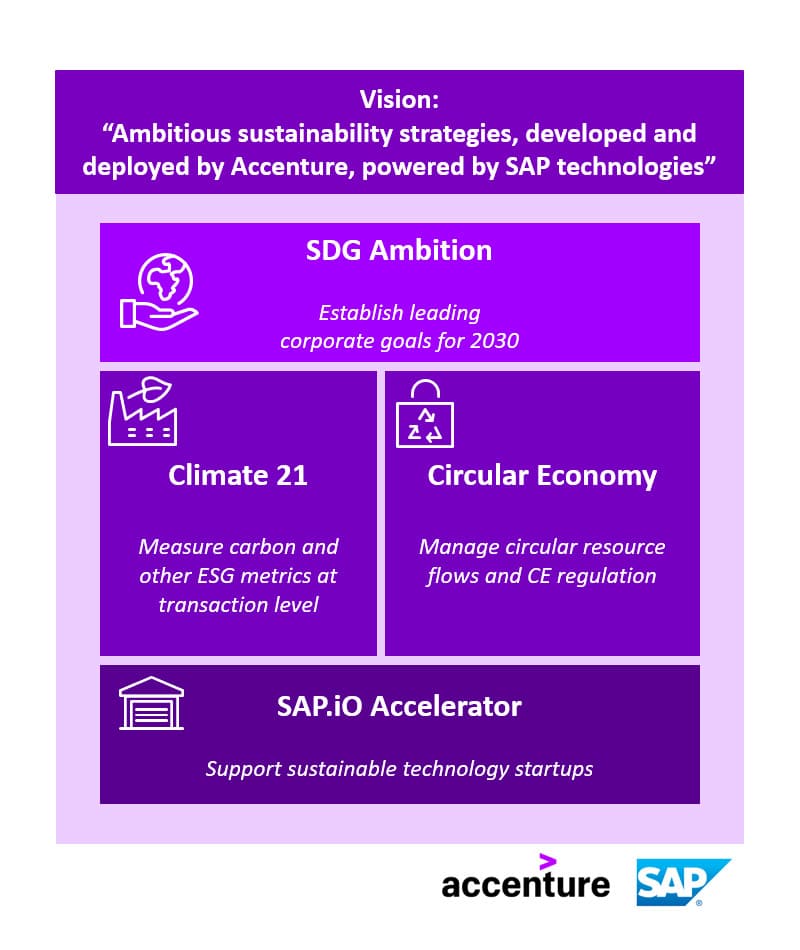Sustainability is the business challenge of our lifetimes.
Customers are increasingly educated and demand products and services that minimize negative environmental impact. Investors are integrating climate risk in their portfolio strategies. Government regulation is on the rise around the world, affecting carbon emissions, waste management, product design, and producer responsibility. Employees are increasingly vocal about their employer’s environmental policies and actions, making it challenging for businesses to recruit top talent without a genuine environmental vision and track record.
Based on Accenture research*, enterprises with high ratings for environmental and social governance (ESG) performance attained operating margins nearly four-times higher than those with low ESG ratings and generated annual total returns to shareholders that were double their peers. According Accenture and United Nations (UN) Global Compact research, 54% of CEOs agree sustainability is critical to the future success of their organizations, and 71% of investors believe the pandemic will accentuate global policies to tackle risks related to climate change.
From Periphery to Core
Enterprises must show accountability through ESG performance and manage end-to-end operations responsibly. By reimagining its business model, any company can operate in an intelligent way, minimize negative environmental impact, and unleash a new dimension of enterprise resource planning (ERP). Decision-makers can use this intelligence to design better products, create engaging experiences, and equip employees to do their best work by eliminating busywork. They can create an efficient, ethical, and adaptable supply chain, reaching beyond organizations and first-tier suppliers to proactively manage performance and risks with trading partners around the world.
Just like any other core business function, sustainability performance must also be managed in real time and integrated into wider business decision making. True, integrated reporting will go hand-in-hand with ESG management, and information transparency will provide a solid foundation to optimize financial results and sustainability performance together.
Most companies have a long way to go before they move beyond the basics of simply reporting ESG performance to actively steering their business operations toward ambitious sustainability goals. While the UN Global Compact’s SDG Ambition program has challenged companies to enhance their commitment to the UN Sustainable Development Goals (SDGs), only 25% have set goals aligned to societal or environmental needs. Although CEOs acknowledge the universal call-to-action to achieve a better and more sustainable future for all, less than 50% have implemented sustainability into their operations.
Words into Actions
 If we plan to deliver on the UN SDGs by 2030, the performance of every process and product must be measured, managed, and delivered against sustainability goals. It is an imperative that spans across the value chain – from companies’ key design decisions to product lifecycle management.
If we plan to deliver on the UN SDGs by 2030, the performance of every process and product must be measured, managed, and delivered against sustainability goals. It is an imperative that spans across the value chain – from companies’ key design decisions to product lifecycle management.
SAP and Accenture believe that steering a company holistically – by looking not only at financials, but also at the social and green bottom lines – leads to better management decisions and more resiliency in their value chain. SAP S/4HANA helps companies to drive bottom line profitability through operational efficiency, top line growth and adaptability. It offers flexible business model innovation and transparency into its green line environmental responsibility. SAP and Accenture’s goal is to make sustainability profitable and profitability sustainable.
To achieve this, enterprises must integrate sustainability into the heart of their strategy and core business systems. This is the rationale behind the collaboration between SAP and Accenture, which focuses on innovation, development, and scaling sustainability across four go-to-market sustainability initiatives:
SDG Ambition: Scaling Business Impact for Decade of Action
The first of these initiatives is our partnership with the UN Global Compact on the SDG Ambition. Announced at the World Economic Forum 2020 in Davos with 3M as Patron Sponsor, SAP and Accenture are rolling out the SDG Ambition Benchmarks and Guidance through the UNGC Accelerator Program. This includes how to implement these goals at a systemic level and how to develop new capabilities powered by SAP technologies. As of today, more than 600 companies have already signed up for the program.
SAP and Accenture are working together to co-innovate and develop new SAP solutions that address sustainability and enhance existing core technologies. Both new and existing systems have a role to play in the other three joint sustainability initiatives.
Circular Economy: Taking Action Toward a Zero-Waste Economy
The power of SAP and Accenture’s partnership enables their customers to better manage material flows through their supply chains and innovate business processes to accelerate the circular economy. The initial focus is on packaging in the consumer goods and retail industries, specifically accelerating the development and delivery of the SAP Responsible Design and Production solution. Designing and promoting reusable products to address waste management is a fundamental principle of the circular economy.
Decarbonization: Enabling Our Customers to Contribute to a Zero-Carbon Economy
SAP and Accenture are working together to offer intelligent technologies that help companies – especially in natural resources, energy, and utilities – account, analyze, manage, and ultimately reduce carbon emissions. If companies cannot account for and manage total carbon emissions, they could lose their competitive edge. Solutions such as the Climate 21 initiative and SAP Product Footprint Management help companies to embed sustainability as a new dimension of success into their analytical and transactional applications to enable ERP and intelligent enterprise to optimize their resources not only of an individual enterprise but across value chains for the entire product life cycle.
Startups: Collaborating with Innovators to Create a Positive Impact on Both Society and Business
Accenture and SAP are also tapping into their respective global innovation networks to nurture and engage startups through a sustainability focused startup program to help address climate action, carbon reporting, and circular economy challenges across industries. Together, SAP and Accenture will leverage this rich source of creativity to help solve our customers’ biggest sustainability challenges.
Helping Companies Become “Twin Transformers”
Untapped value exists at the intersection of digital technologies and sustainability, though only a few companies – referred to as “Twin Transformers” by Accenture – already link the two.
From now on, twin transformation – directing innovation investment to initiatives that combine sustainability impact and the power of technology as opposed to splitting resources between advancing sustainability and technology deployment – will be critical to success. Companies that harness emerging technologies while finding new sources of value and pushing for green operations will gain a competitive advantage.
Our customers provide daily proof of just how relevant our solutions are. Together, SAP and Accenture are committed to working with customers to make their sustainability ambitions a reality.
We are showcasing our vision to jointly build a sustainable future at the SAP Sustainability Summit on April 28 and 29. Stay tuned for updates!
Jan Gilg is president of SAP S/4HANA at SAP.
Peter Lacy is chief responsibility officer and Global Sustainability Services lead at Accenture.
*Source: Research analysis by Arabesque S Ray



